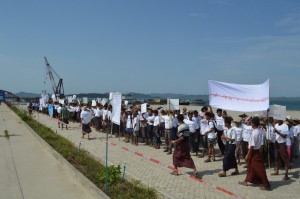A Dangerous Precedent for Development in Burma
By Burma Partnership • September 30, 2013 On 30 September, Shwe Gas Movement released a new report entitled, “Drawing The Line: The Case Against China’s Shwe Gas Project, For better Extractive Industries in Burma”. The report highlights the consequences, violations, unequal development, inadequate laws and the dangerous precedent set by the Shwe Gas Project. With increased investment and the liberalization of Burma’s economy, development projects similar to Shwe Gas are set to increase. If they follow a path of code and conduct similar to the Shwe Gas Project, the future of Burma will be rife with increased land confiscation, labor abuse, environmental degradation, loss of livelihoods, conflict, arrests and imprisonment of rights activists defending themselves and their communities. The benefits will be unequally distributed and negative consequences will be borne by farmers, fishermen, and by the citizens of Burma.
On 30 September, Shwe Gas Movement released a new report entitled, “Drawing The Line: The Case Against China’s Shwe Gas Project, For better Extractive Industries in Burma”. The report highlights the consequences, violations, unequal development, inadequate laws and the dangerous precedent set by the Shwe Gas Project. With increased investment and the liberalization of Burma’s economy, development projects similar to Shwe Gas are set to increase. If they follow a path of code and conduct similar to the Shwe Gas Project, the future of Burma will be rife with increased land confiscation, labor abuse, environmental degradation, loss of livelihoods, conflict, arrests and imprisonment of rights activists defending themselves and their communities. The benefits will be unequally distributed and negative consequences will be borne by farmers, fishermen, and by the citizens of Burma.
The Shwe Gas Project is the largest extractive resource project in Burma with dual gas and oil pipelines traveling almost 800km beginning in Arakan State, passing through Magway and Mandalay Regions, exiting Burma through northern Shan State and terminating in Kunming, China. The now operational project provides China with a valuable energy transportation system and is expected to earn US$54 billion for the Burma government, a government that was given the lowest resource governance ranking in the world three months ago by the Revenue Watch Institute.
This is the first major development project to be completed in Burma since the country began its reform process and will set the standard for future development. Judging by the information from the Shwe Gas Movement’s report and previous ones, this is extremely worrying. Land has been confiscated with inadequate or no compensation given, proper consultation was absent, environmental standards were disregarded and any dissenting voices were viciously suppressed. Last week ten activists peacefully protesting the Shwe Gas Project on Maday Island in Arakan State were arrested and sentenced to three months in prison. They were charged with protesting without permission under Article 18 of the Peaceful Assembly and Peaceful Procession Law, despite the fact that they had applied four times to hold the peaceful protest.
This development project is more than the pipeline; there are also offshore natural gas platforms, an onshore natural gas terminal, a deep sea port and a crude oil storage facility. It has been reported that there will be US$1.6 million spent in 2013 alone on socioeconomic development projects in association with the pipeline. If there continues to be a similar pattern of absent due diligence, inadequate harm mitigation, and weak environmental protection, these projects could again bring more harm than good to the local communities.
The Shwe Gas Project is just the beginning of large-scale problem-riddled development projects. The Tavoyan Women’s Union (TWU) released a video on 26 September highlighting the abuses resulting from the Tavoy Deep Sea Port project. The video highlights environmental destruction, threats of eviction and the loss of livelihoods and cultural heritage. TWU and the local communities are calling for an immediate halt to the project.
As the “Drawing The Line” report states, “Investors are clamoring at our door. They want our resources.” How these projects are developed, how the resources are used, what standards are followed or ignored, will have a tremendous impact on peoples and communities, and thus the future of Burma. They will play a significantly large role in determining if Burma develops into a prosperous, free and democratic country where all people are able to live in dignity, peace, justice and harmony, or if Burma’s future will be continually marred by conflict, human rights violations and environmental destruction where people will continue to live in despair and insecurity.
Tags: Burma Partnership, Environment, Human Rights Violations, Land Confiscation, Shwe Gas Movement, Shwe Gas Project, Tavoy Deep Sea Port, Tavoyan Women's UnionThis post is in: Aid and Development, Blog, Business and Human Rights
Related PostsBurma Partnership Celebrates Continuing Regional Solidarity for Burma and Embraces the Work Ahead for Progressive Voice
Burma Army Displays Blatant Disregard for 21st Century Panglong Peace Process
Ann Din Coal Power Plant: Local Movement and Action to Preserve and Protect Natural Resources and Land: Mon IDP Report Case Study #4
Latest Human Rights Abuse Case Demonstrates Urgent Need to Reform the Myanmar National Human Rights Commission
Human Rights Far From Guaranteed as US Sanctions on Burma Are Removed









 All posts
All posts